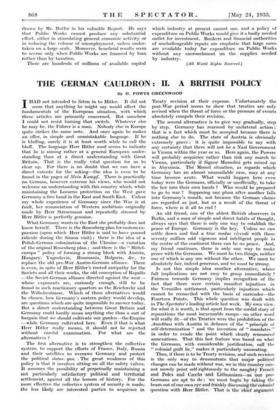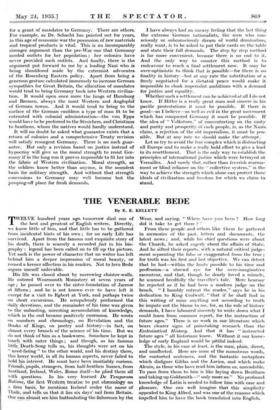THE GERMAN CAULDRON : II. A BRITISH POLICY
By H. POWYS GREENWOOD IHAD not intended to listen in to Hitler. It did not seem that anything he might say would affect the fundamentals of the European situation, with which these articles are primarily concerned. But somehow I could not resist turning that switch. Whatever else he may be, the Fiihrer is a man. Nobody else in Europe quite strikes the same note. And once again he makes an offer, in simple and unmistakable language. If he is bluffing, surely it is at least worth while to call the bluff. The language Herr Hitler used seems to indicate that lie is aiming rather at a general European under- standing than at a direct understanding with Great Britain. That is the really vital question for us to clear up. For there is no doubt that we can have a direct entente for the asking—the idea is even to be found in the pages of Mein Kampf. There is practically no German, however extreme his views, who would not welcome an understanding with this country which, while maintaining the Locarno protection on the West gave Germany a free hand in the East and South East. Unles4 my whole experience of Germany since the War is at fault, her renunciation of Western ambitions originally made by Herr Stresemann and repeatedly stressed by Herr Hitler is perfectly genuine.
What Germany wants in the -East she probably does not know herself. There is the Rosenberg plan for eastern ex-. pansion (upon which Herr Hitler is said to have poured ridicule during the Simon visit) ; there is the idea of a Polish-German colonization of the Ukraine—a variation of the original Rosenberg plan ; and there is the " Mittel- europa " policy of forming a strong block with Austria, Hungary, Yugoslavia, Roumania, Bulgaria, &c., to replace the old pre-War Austro-German alliance. There is even, in spite of Herr Hitler's rooted antipathy for the Soviets and all their works, the old conception of Rapallo —the Soviet-German affiance directed against the west— whose exponents are, curiously enough, still to be found in such reactionary quarters as the Reichwehr and the Wilhelrnstrasse. Which of these alternatives would be chosen, how Germany's eastern policy would develop, are questions which are quite impossible to answer today.. But a direct understanding between Great Britain and Germany could hardly mean anything else than a sort of bargain that we should cultivate our garden—the Empire —while Germany cultivated hers. Even if that is what Herr Hitler really means, it should not be rejected without careful examination. For what are the alternatives ?
The first alternative is to strengthen the collective system, to support the efforts of France, Italy, Russia and their satellites to overawe Germany and protect the political status, quo. , The great weakness of this policy is that it involves sitting .on all the safety valves.. It assumes the possibility of perpetually maintaining a not particularly satisfactory political and territorial settlement, against all the lessons of history. For the more effective the collective system of security is made; the less likely are interested parties to acquiesce in Treaty revision at -their expense. -Unfortunately the post-War period seems to show that treaties are only revised when the threat of force or the pressure of events absolutely compels their revision.
The second alternative is to give way gradually, step by step. Germany has rearmed by unilateral action ; that is a fact which must be accepted because there is nothing else to do. The state of Austria is obviously extremely grave ; it is quite impossible to say with any certainty that there will not be a Nazi Government in Vienna within the year or so. Here again, the Powers will probably acquiesce rather than risk any march to Vienna, particularly if Signor Mussolini gets mixed up in Abyssinia. The Memel situation, as regards which Germany has an almost unassailable case, may at any time become acute. What would happen here even today were the Germans, officially or unofficially, to take the law into their own hands ? Who would be prepared to go to war ? Supposing one plum after another falls into Germany's mouth, not because the German claims are regarded as just, but as a result of the threat of force, where is it all to end ?
An old friend, one of the ablest British observers in Berlin, and a man of simple and direct habits of thought, always says that there is only one way to establish the peace of Europe. Germany is the key. Unless we can settle down and find a true modus vivendi with those seventy million odd vigorous and intelligent people in the centre of the continent there can be no peace. And, my friend continues, there is only one way to make peace with the Germans. We must be two things, neither one of which is any Use without the other. We must be absolutely fair, indeed generous, and we must be strong.
Is not this simple idea another alternative, whose full implications are not easy to grasp immediately ? Fairness towards Germany implies recognition of the fact that there were certain manifest injustices in the Versailles settlement, particularly injustices which cannot be reconciled with the basis of surrender—the Fourteen Points. This whole question was dealt with in The Spectator's leading article last week. MY own view, for what it is worth, is that apart froni the sordid story of reparations the most inexcusable ramps—no other word will really fit—of the Treaties were the prohibition of the Anschluss with Austria in defiance of the " princiPle of self-determination " and the invention of " mandates " in order to evade the point which clearly 'renounced annexations. 'That this last feature"was based on what the Germans, with considerable justificatidn; all the " eolonial guilt lie," makes it particularly nauseating.
Thus, if there is to be Treaty revision; and such revision is the only way to demonstrate that major politleal changes can made without war, we'in this'eOuntry can- not merely point self-righteously to the naughty French and Poles and Czechs -and Litlniariiansai lirO- Germans are apt to do -We must begin by taking the bea' out of our own eye arid frghkly discussing the colonial question with Herr Hitler. • That is ' the- Chief aignimeint for a grant of mandates to Germany. There are others. For example, as Dr. Schacht has pointed out for years, in this age of economic war the possession of raw materials and tropical products is vital. This is an incomparably stronger argument than the pre-War one that Germany needed outlets for her population.; her colonies have never provided such outlets. And finally, there is the argument put forward to me by a leading Nazi who is being shouldered aside by the extremist advocates of the Rosenberg Eastern policy. Apart from being a generous gesture calculated immensely to increase German sympathies for Great Britain, the allocation of mandates would tend to bring Germany back into Western civiliza- tion. It would open once more the lungs of Hamburg and Bremen, always the most Western and Anglophil of German towns. And it would tend to bring to the surface of the German cauldron a type of man fit to be entrusted with colonial administration—the von Epps would have to be preferred to the Streichers, and Christians to heathens, whom the natives would hardly understand.
It will no doubt be asked what guarantee exists that a return of colonies and a comprehensive Treaty revision will satisfy resurgent Germany. There is no such guar- antee. But only a revision based on justice instead of hypocrisy will give us the moral strength to resist Ger- many if in the long run it proves impossible to fit her into the fabric of Western civilization. Moral strength, as the soldiers know better than anyone, is the soundest basis for military strength. And without that strength concessions to Germany may well become but the jumping-off place for fresh demands. I have always had an uneasy feeling that the last thing the extreme German nationalists, . the men who con- sciously or subconsciously dream of world domination, really want, is to be asked to put their cards on the table and state their full demands. The step by step method is far more convenient, because there is no end to it. And the only way to counter this method is to endeavour to reach a final settlement now. It may be over-optimistic to think that is possible—for there is no finality in history—but at any rate the substitution of a freely negotiated for a dictated peace would make it impossible to cloak imperialist. ambitions with a demand for justice and equality.
Whether such a settlement can be achieved at all I do not know. If Hitler is a really great man and sincere in his pacific protestations it must be possible. If there is good—as I believe—as well as evil in the great movement which has conquered Germany it must be possible. If the idea of " Volkstum," of concentrating oh the unity and purity and prosperity of each people, is, as the Nazis. claim, a rejection of the old imperialism, it must be pos- sible. But at any rate we should make the attempt. - Let us try to avoid the fear complex which is distracting all Europe and to make a really bold effort to give a lead in its resettlement. That is the only way to establish 'the principles of international justice which were betrayed at Versailles. And surely that, rather than feverish rearma- laient or blind reliance on the " collective system," is' the way to achieve the strength which shine can protect those ideals of civilization and freedom for which we claim to stand.















































 Previous page
Previous page